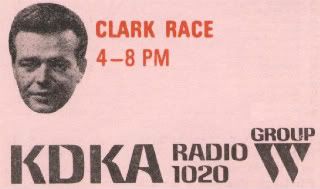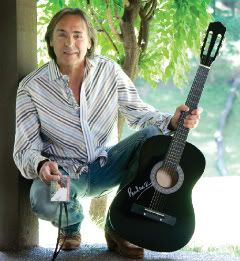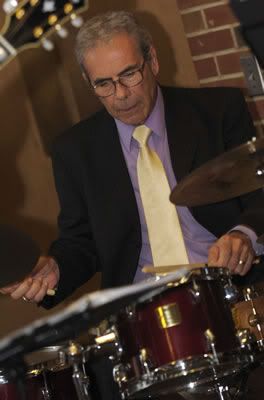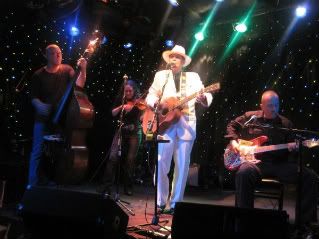
Clark Race image from Jeff Roteman
Hey, everyone of a certain age recalls the glory years of Pittsburgh radio with the likes of Porky, TL and Mad Mike. But the guy that drew the listeners of the Steel City en masse was KDKA's Clark Race.
He started out by making rather than spinning music. Race was the youngest of eight children growing up in the Depression era, but his parents always managed to scrape together enough coin to keep him in instruments.
As a kid, he played trumpet, accordion and trombone, and led his high school band. Race and his folks attended a fundamentalist church when he was a boy where he developed a love of gospel music.
Race even tried his hand at the tunesmith's craft, writing and recording the ballad "Shy Boy" in 1959. Though it was never released, his wife still has the demo tape.
Like many radio jocks, the Hudson, N.Y., native started his radio career in 1958 as a sportscaster doing local baseball games in Albany. His career as a vinyl spinner began out of the blue when his station manager told him that he wanted him to DJ.
It was the era of jock-driven programming, so he went out to an Albany record store and bought some disks of the songs he liked. Listeners liked the tunes, too, and his show caught on.
Westinghouse heard of Race's popularity and offered him a job at KDKA-AM as part of its effort to attract a younger audience. The 26 year-old came to Pittsburgh in 1959, and hosted a drive time show that owned the City's ear and car radios until 1970.
His opener of "Hi!" - "Hello Clark Race, Hello" (sung), - "And welcome to the show" followed by his theme song, "String of Trumpets" by Billy Muir was burned into the memory of virtually every teen AM radio listener in the sixties. So was his signoff "It's so nice to know so many nice people," lifted from noted DC jock Eddie Gallaher.
At its height, Race's show captured more than 50 percent of the audience, a huge number in the competitive local market. Like the other DJ's, the Top 40 was whatever he decided it would be, and his tastes covered the board.
Following the suburban jocks, Race brought the music of black artists to his mainstream audience. His playlist mixed pop, rock, soul, country and standard hits, and featured local artists like Lou Christie, the Vogues, the Electrons, the Racket Squad and Bobby Vinton.
Race was a master of evaluating songs, breaking Lou Christie's "Lightning Strikes," Bobby Vinton’s breakout tune, "Roses Are Red" and even the novelty ditty of the Royal Guardsmen, "Snoopy and the Red Baron."
He helped create huge local hits by spotlighting "Hanky Panky" by Tommy James, "Because Of You" by Rome & Paris, "It Ain't No Big Thing" by the Electrons, "Cross My Heart" by Billy Stewart, "Hung Up" by the Racket Squad and many others.
How big was he? Beatles manager Brian Epstein invited Race to go to London and meet the Beatles along with Murray the K. That eventually led to one of the few one-upped moments of his life.
The "Fun Lovin' Five" of KQV were KD's main music radio rivals. Their station manager finagled a plane ride from New York to Pittsburgh for Chuck Brinkman and Dexter Allen with the mop-tops that had been promised to Race, who got rudely bumped off the passenger list, along with intro honors (which hadn't been promised; the promoters had a KQV tie-in) for the Beatles' 1964 Civic Arena show. He made sure his audience knew all about the slight, too.
And Race wasn't just a studio wonder. His hops drew kids from all around the region, and in 1963, KDKA-TV began airing Clark Race's "Dance Party," a knock-off of Dick Clark's "American Bandstand" (he inherited the show from Randy Hall) every Saturday until 1966. To get some camera love on the show was a big thing to a high school pair. He drew all the top acts for his fans' dancing pleasure, like the Supremes and Chubby Checker.
His most memorable moment may have been when he had the Strangeloves of "I Want Candy" fame on the show. They had an elaborate cover story of being Australian brothers named Strange. It was concocted by their producers to create a little cachet; in reality they were just touring session players from New York. One part of the tale was that one of the members was a boomerang champ from the Land Down Under.
Live on air, Race handed the guy a boomerang for a demonstration. Never having so much as seen one before, the Strangelove promptly threw it into a camera, knocking it over. Clark asked if that was really the right way to toss the boomerang, and the quick-witted if somewhat sassy reply was "That's why I'm the champion and you're not." Now that's reality TV.
Heck, he even started one of his brother KD jocks on a second career. The late Bob "Tiger Troop" Tracey saw Race ride his Vespa, one of his passions, into the station lot one Saturday. Tracey borrowed it over the weekend, and his love for two-wheeled vehicles was born. He operated Bob Tracey's World of Cycles in Moon for twenty years after he got out the business.
But all things come to an end, and after eleven years in Pittsburgh, Race joined KMPC, owned by Gene Autry, in Los Angeles in 1971. Race was widely considered to be the heir apparent to the station's morning top dog Dick Whittinghill. He got to moonlight, too, when in 1972 Race became the host for ABC-TV's game show "The Parent Game," produced by Chuck Barris.
But working the overnight shift, he never connected with the Southern Cal listeners like he did with his Pittsburgh audience.
Race left the station in 1978 and drifted to gigs in San Francisco and San Diego, finishing his West Coast broadcasting in 1980 working mornings for contemporary Christian music station KBRT on Catalina Island. Like many radio jocks from the early years, he left the business because the power had switched from the DJs to the programming directors.
He returned to Pittsburgh in 1986, opening a bed and breakfast in Sewickley with his wife Diane, and in 1993 they bought another B&B in Amish country, New Wilmington. The Lawrence County inn became Clark & Diane's home. It was actually a dream vocation for the pair, who could often be seen tooling around the area, running errands and giving local tours to their guests.
Race had offers to return to local radio, but always with an oldies format. Race turned them down, not wanting to be caught in that niche; he was listening to Natalie Merchant, Enya and Kenny Rogers, not Bobby Vinton and Lou Christie, in the eighties and nineties.
In 1999, Clark Race died at the age of 66 after a heart attack and a lengthy battle with throat cancer. Diane Race said one of her husband's last hopes was that he could scare off others from smoking, a long-time habit of his.
He had an impressive send off. After all, as Clark Race always said, "It's so nice to know so many nice people." They knew and remembered him.
"String of Trumpets" by Billy Muir


